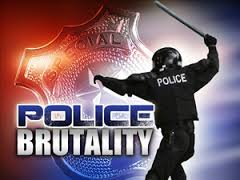 Police brutality is an ugly term that we don’t want to hear. Unfortunately it’s part of the necessary and sometimes nasty business called policing. Fortunately, though, it rarely occurs.
Police brutality is an ugly term that we don’t want to hear. Unfortunately it’s part of the necessary and sometimes nasty business called policing. Fortunately, though, it rarely occurs.
What triggered this post is an email from Kristen, a DyingWords follower, who wrote –
I’m a sophomore in high school and we are in the process of writing a research paper. My topic is about the use of force by police and I was wondering if you could just give some pros and cons about police brutality, it would help me tremendously.
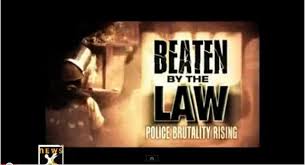 I was a cop for a lot of years and I’m not going to pretend that cases of police brutality don’t occur. I can say that I never, personally, saw a case of truly excessive force although I’ve seen some pretty violent struggles during arrests. Occasionally officers went a little overboard (myself included) during the heat of the moment, but I never saw a case where someone got thumped out where they didn’t instigate it themselves.
I was a cop for a lot of years and I’m not going to pretend that cases of police brutality don’t occur. I can say that I never, personally, saw a case of truly excessive force although I’ve seen some pretty violent struggles during arrests. Occasionally officers went a little overboard (myself included) during the heat of the moment, but I never saw a case where someone got thumped out where they didn’t instigate it themselves.
First the question “What’s the definition of police brutality?”
I did a little Googling and got this definition from good ol’ Wikipedia:
Police brutality is the wanton use of excessive force, usually physical, but can also occur in forms of verbal attacks and psychological intimidation by a police officer. It is one of several forms of police misconduct, which include: false arrest, intimidation, racial profiling, political repression, surveillance abuse, sexual abuse, and police corruption.
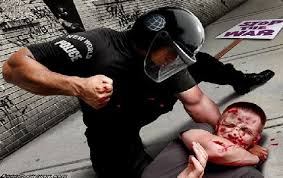 There’s a fine line separating the justified use of force in effecting a lawful arrest and what would be deemed excessive. Virtually all jurisdictions allow police officers to use “as much force as is necessary” in their powers of arrest. Any force beyond what is necessary can be considered an assault and officers can be held criminally responsible for applying excessive force.What would be considered excessive to the point of being brutal, cruel, or savage would have to be weighed on a case by case basis and a close look at the particular circumstances.
There’s a fine line separating the justified use of force in effecting a lawful arrest and what would be deemed excessive. Virtually all jurisdictions allow police officers to use “as much force as is necessary” in their powers of arrest. Any force beyond what is necessary can be considered an assault and officers can be held criminally responsible for applying excessive force.What would be considered excessive to the point of being brutal, cruel, or savage would have to be weighed on a case by case basis and a close look at the particular circumstances.
I’d have to say that real police brutality would be something more than just mere excessive force where an individual officer got a little carried away. Probably the best definition would be “an unacceptable act of violence used by agent(s) of the state on civilized citizen(s)”.
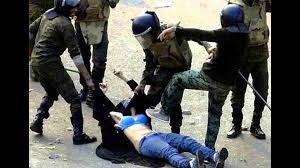 Over the years the majority of police brutality claims have come from riot, protest, or strike incidents where the police have weighed in with clubs and beat defenceless citizens. Some of these had racial overtones. Unfortunately, there are also many incidents where a single individual has been brutalized at the hands of police officers.
Over the years the majority of police brutality claims have come from riot, protest, or strike incidents where the police have weighed in with clubs and beat defenceless citizens. Some of these had racial overtones. Unfortunately, there are also many incidents where a single individual has been brutalized at the hands of police officers.
The Rodney King case from Los Angeles in 1991 is one of the highest profile cases of true police brutality.
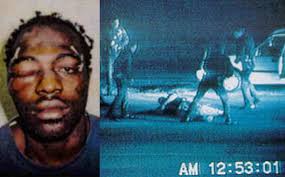 King was a construction worker who became nationally known after being beaten by LAPD officers following a high-speed chase. A witness videotaped the takedown which showed four officers surrounding King, several of them striking him repeatedly with fists and batons, while other officers stood by. The footage was aired around the world, inflaming outrage in cities where racial tensions were high, and raising public concern about police treatment of minorities.
King was a construction worker who became nationally known after being beaten by LAPD officers following a high-speed chase. A witness videotaped the takedown which showed four officers surrounding King, several of them striking him repeatedly with fists and batons, while other officers stood by. The footage was aired around the world, inflaming outrage in cities where racial tensions were high, and raising public concern about police treatment of minorities.
Four officers were charged with assault with a deadly weapon and use of excessive force. They were acquitted at state level which triggered the 1992 Los Angeles Riots in which 53 people were killed and over 2,000 were injured. The acquittals led to the federal government’s obtaining grand jury indictments for violations of King’s civil rights. The four officers were tried in federal court with two being found guilty and imprisoned. The other two were again acquitted.
Vancouver, Canada, is not without a black eye from police brutality.
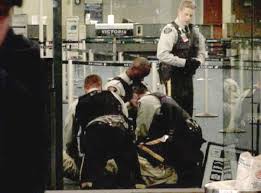 Robert Dziekanski was a Polish citizen who was Tasered five times by four Royal Canadian Mounted Police officers during an arrest at Vancouver International Airport in 2007 and died at the scene. This too was captured on video by a bystander and showed that several of the Taser applications took place when Dziekanski was in handcuffs on the floor.
Robert Dziekanski was a Polish citizen who was Tasered five times by four Royal Canadian Mounted Police officers during an arrest at Vancouver International Airport in 2007 and died at the scene. This too was captured on video by a bystander and showed that several of the Taser applications took place when Dziekanski was in handcuffs on the floor.
A massive investigation took place which recommended that the officers not be criminally charged for using excessive force. This was not well received by the public who demanded an independent inquiry. This took place over a two year period resulting in the judge severely chastising the officers for not only their brutality but in their deceit during the inquiry. These officers are currently going through perjury trials and may well end up in jail – not for assault – but for lying to the inquiry.
 One of the biggest criticisms in police brutality accusations is the lack of impartiality when the police investigate themselves. Most jurisdictions now have agencies of independent oversight, however those are not without flaw as they rely on investigative expertise by hiring ex-police officers. The Independent Investigations Office in British Columbia, for instance, is horribly dysfunctional and over half the staff have been fired or quit.
One of the biggest criticisms in police brutality accusations is the lack of impartiality when the police investigate themselves. Most jurisdictions now have agencies of independent oversight, however those are not without flaw as they rely on investigative expertise by hiring ex-police officers. The Independent Investigations Office in British Columbia, for instance, is horribly dysfunctional and over half the staff have been fired or quit.
There’s also a number of citizen-based watchdogs. Some are simply anti-authority cop-haters with an axe to grind or left-wing, bleeding heart, civil rights groupies.
 One of the seemingly credible groups is Copwatch. It’s been around since 1990 and is a network of activist organizations in the United States and Canada that observe and document police activity while looking for signs of police misconduct and brutality.
One of the seemingly credible groups is Copwatch. It’s been around since 1990 and is a network of activist organizations in the United States and Canada that observe and document police activity while looking for signs of police misconduct and brutality.
My experience is that the vast majority of police officers are very sensible, controlled people who have a difficult job. The sad reality is that individual cases of police excessive force still occur and will always occur. Most are incidents where tempers flare and things get carried away.
